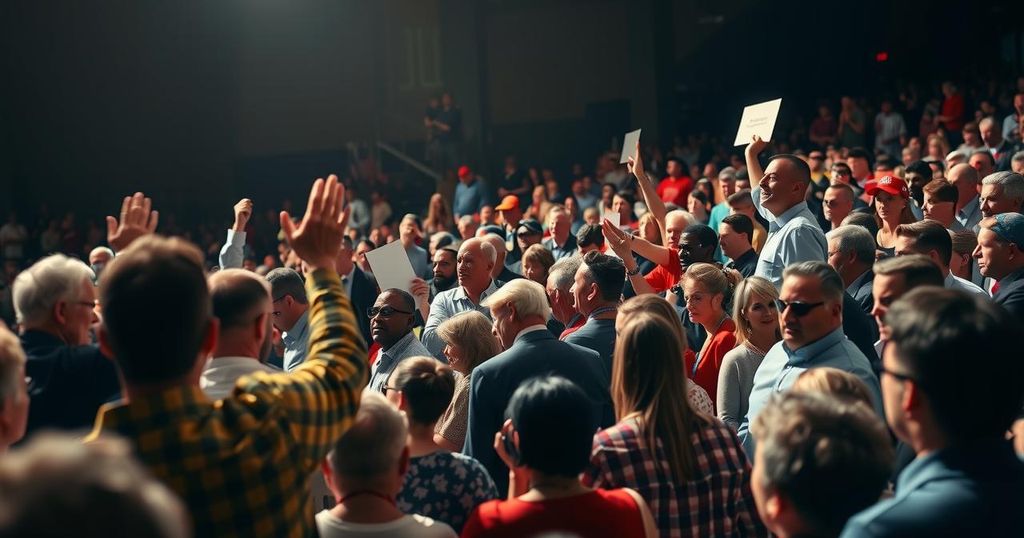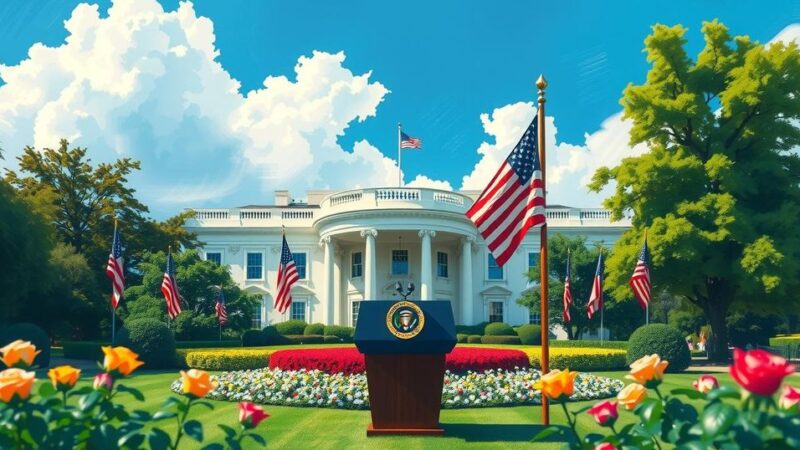Former President Donald Trump and Vice President Kamala Harris are intensively campaigning for the Latino vote in southwestern states ahead of Election Day. With Latino voters representing 14.7% of eligible voters, both candidates are attempting to connect with this demographic. Trump’s focus is on immigration and border issues, while Harris emphasizes economic themes alongside criticism of Trump’s divisive rhetoric. Polls indicate shifting trends among Latino voters, complicating traditional voting patterns in crucial battleground states.
In the lead-up to the imminent Election Day, former President Donald Trump and Vice President Kamala Harris have intensified their campaigning efforts across southwestern states, focusing on securing the critical Latino vote. With individuals of Latino descent representing approximately 14.7% of eligible voters according to the Pew Research Center, both candidates are positioning themselves strategically. New Mexico, which Trump visited on Thursday, boasts the highest concentration of Latino voters at nearly 45% of its population. Other states with significant Latino demographics include California, Texas, Arizona, and Nevada. While California aligns with the Democratic Party and Texas with the Republican Party, Arizona and Nevada are categorized as battleground states, where both candidates aim to make inroads. Historically, the Democratic Party has enjoyed a favorable standing among Latino voters; however, recent trends indicate a decline in this advantage over the past four presidential elections, as evidenced by a September NBC News/Telemundo/CNBC poll. Notably, Trump has made inroads with Latino men, hindered in part by concerns over inflation and the escalating cost of living—issues where voters appear to favor Trump over Harris. During his rally in Albuquerque, New Mexico, Trump remarked, “So I’m here for one simple reason. I like you very much, and it’s good for my credentials with the Hispanic or Latino community,” expressing his desire to connect with Latino voters directly. Despite New Mexico’s blue-leaning tendencies—President Biden edged out victory by 10.8 points in 2020—the former President remains optimistic about changing its electoral landscape, stating, “We almost won it twice, and let me tell you, I believe we won it twice,” implying allegations of electoral fraud in previous elections. He emphasized immigration issues during his campaign, which he believes resonate with voters, saying, “One of the biggest reasons we will win this state is that you have among the worst border problems of any state in America, and I am the only one that knows how to fix it.” Nevertheless, Trump’s campaign has been embroiled in controversy following derogatory remarks made by comedian Tony Hinchcliffe at one of Trump’s rallies. Despite efforts from campaign officials to distance Trump from these comments, he has yet to issue a personal apology. While immigration and border security were central themes of Trump’s address, recent polling suggests that these are not the primary concerns for Latino voters, who rated inflation, job security, and threats to democracy as more pressing issues. Conversely, Vice President Harris conducted a series of rallies in Phoenix, Arizona, and Reno and Las Vegas, Nevada, presenting a markedly different narrative. “With five days left in this campaign, my opponent is also making his closing argument to America. It is an argument full of hate and division,” Harris asserted during her Phoenix rally, criticizing Trump’s immigration policies. She notably engaged with Latino cultural figures during her events, such as Jennifer Lopez, who underscored the unity of Latino communities against divisive rhetoric, stating, “It wasn’t just Puerto Ricans that were offended that day, it was every Latino in this country.” As November 5 approaches, both candidates have ramped up their outreach efforts to appeal to Latino constituents. Trump recently organized a roundtable event in Florida with Latino business leaders, while Harris participated in a pre-taped interview with Telemundo to further engage this vital demographic.
As the electoral process approaches its climax, both major candidates are aware of the increasing importance of Latino voters, who have historically leaned toward the Democratic Party but are displaying more diverse political inclinations. With economic concerns such as inflation being pivotal in this cycle, both camps are attempting to address these issues while attempting to influence the perceptions and voting behaviors of Latino Americans across critical swing states.
In conclusion, the battle for the Latino vote is intensifying as Election Day approaches, with both Trump and Harris strategically targeting this demographic. Trump’s approach has been challenged by controversy, while Harris emphasizes a message of unity and economic recovery. The dynamics in states like New Mexico, Arizona, and Nevada could significantly shape the electoral outcome, making the engagement of Latino voters crucial for both candidates. As they finalize their campaigns, their ability to address the pressing issues facing these voters will likely determine their success at the polls.
Original Source: www.cnbc.com






